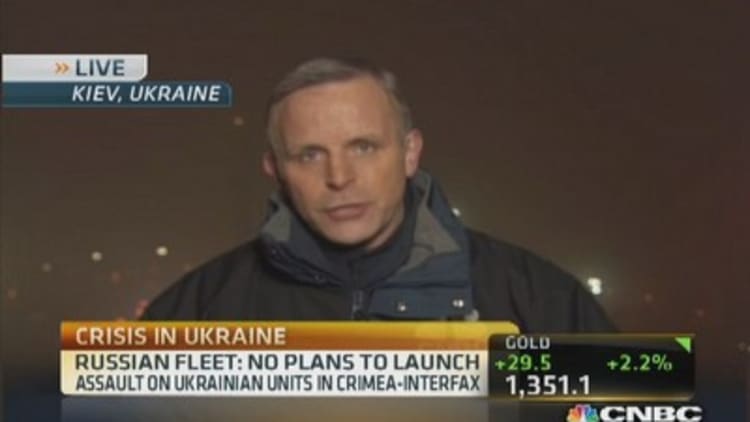Ukraine's oligarchs are struggling to preserve their wealth, and that means getting in with the new leadership and distancing themselves from the old regime as Ukraine plunges deeper into turmoil, according to regional experts and businessmen interviewed by CNBC.
"Right now, they are afraid of the new leadership," said a prominent Russian businessman who spoke to CNBC on the condition of anonymity.
Amid the political turbulence rattling Ukraine, some oligarchs have scored new government jobs. Billionaire Ihor Kolomoyskyi, for example, was named head of Dnipropetrovsk Regional Administration on Sunday.
Also Sunday, Sergey Taruta, another billionaire businessman, was appointed as the new regional governor of Donetsk, where pro-Kiev demonstrations this week have overtaken pro-Moscow demonstrations in size, Reuters reported Thursday.
(Read more: Putin on the Ritz? Russian said to have billions)
Kolomoyskyi and Taruta did not return phone calls from CNBC requesting comment.
Oligarchs perceived as being especially close with the leadership of fugitive president Viktor Yanukovych, who fled the country last month, face a particularly difficult situation.
Sergey Kurchenko, for example, a former Yanukovych ally whose wealth accelerated when the president was in power, has already been accused of money laundering by members of the new Ukrainian government. Stratfor Eurasia analyst Eugene Chausovsky told CNBC that Kurchenko's assets would likely be targeted by the new Ukrainian government—and even possibly by the West.
(Read more: The 'quiet billionaires' shaping Ukraine's future)
Then there's Ukraine's wealthiest man, Rinat Akhmetov. The oligarch is believed to be worth $15 billion—for perspective, that also happens to be the amount of aid the European Union is preparing for Ukraine in order to help the country regain its economic footing.
Chausovsky and other analysts said that Akhmetov can monetarily influence who will be in power in Ukraine in the first place, since would-be leaders would most likely require his support to finance campaigns and other political projects.
"However, he may come under greater pressure from Russia, and will walk a very fine line and be careful with Moscow," Chausovsky said.
Alexander Gordin, managing director of Broad Street Capital, who has had business dealings in Russia and Ukraine for more than two decades, said it's not a bad idea to put oligarchs in power—a sentiment echoed by the Russian business source who spoke with CNBC.
"They were asked to be in charge. This is the wise thing to do though because they are smart, they know how to lead, and they have money," the source said. "At this point, they are united with the people. It sounds strange, but maybe such blatant Russian aggression has united them."
(Read more: Ukraine: A fight for economic freedom)
Sources both within the region and without accused officials and oligarchs of benefiting themselves financially under the old regime.
"The unbridled ability of Ukrainian officials" to benefit from the access their jobs gave them "led to this situation in the first place," said Edward Mermelstein, an attorney and adviser on cross-border investments in Russia.
(Read more: Why Crimea matters)

The main question, said Ian Brzezinski, a senior fellow at the Atlantic Council who focuses on trans-Atlantic security, is how much the oligarchs will be willing to sacrifice for the good of Ukraine.
"If they don't, clearly the nation's ability to leverage this defining moment will be undercut, and they will be responsible for a historic failure," he said.
—By CNBC's Dina Gusovsky. Follow her on Twitter at @DinaGusovsky. CNBC's Ted Kemp and Michelle Caruso-Cabrera contributed to this report.


